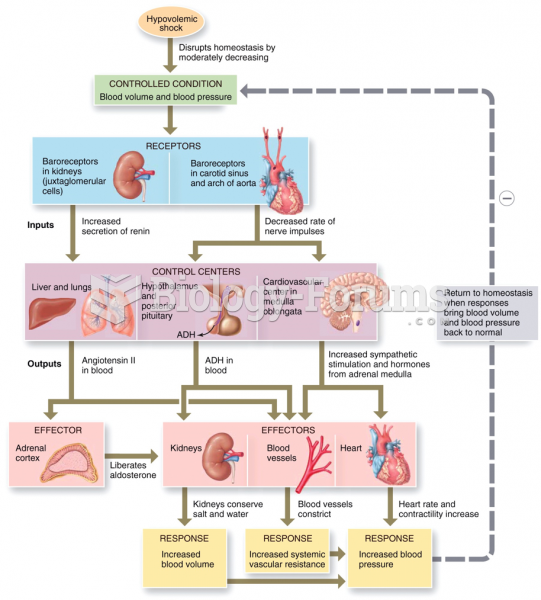Answer to Question 1
4
Rationale 1: Maintenance of the airway is a priority in anaphylactic shock.
Rationale 2:Maintenance of heart rate is a priority in cardiogenic shock.
Rationale 3:Maintenance of brain tissue from trauma to the brain or spinal cord is a symptom of neurogenic shock.
Rationale 4: If the client has lost a significant amount of blood or other body fluids due to obvious trauma or bleeding, this is a priority in hypovolemic shock. Immediate maintenance of blood volume through the administration of fluid and electrolytes or blood products is essential.
Global Rationale: Diagnosis of shock is based on the type of shock observed. Obvious trauma or bleeding would indicate hypovolemic shock and the maintenance of blood volume is the priority. Neurogenic shock is from trauma to the brain or spinal cord and the maintenance of brain tissue is the priority. Cardiogenic shock is focused on the priority of maintaining the heart rate. Anaphylaxis has a hallmark symptom of difficulty breathing and the maintenance of the airway is the priority.
Answer to Question 2
1, 4
Rationale 1: Heart and brain need a continuous supply of oxygen and nutrients.
Rationale 2: Liver does not need a continuous supply of oxygen and nutrients.
Rationale 3:Kidneys do not need a continuous supply of oxygen and nutrients.
Rationale 4: Heart and brain need a continuous supply of oxygen and nutrients.
Rationale 5: Muscles need a continuous supply of blood flow to function but not oxygen.
Global Rationale: All tissues in the body are dependent on a continuous supply of oxygen and vital nutrients, especially demanding are the heart and brain. Should the blood supply to the cardiac muscle become compromised, cardiovascular function may become impaired, resulting in angina pectoris, myocardial infarction, and death. Should the blood supply to the brain become interrupted, a stroke can occur.







